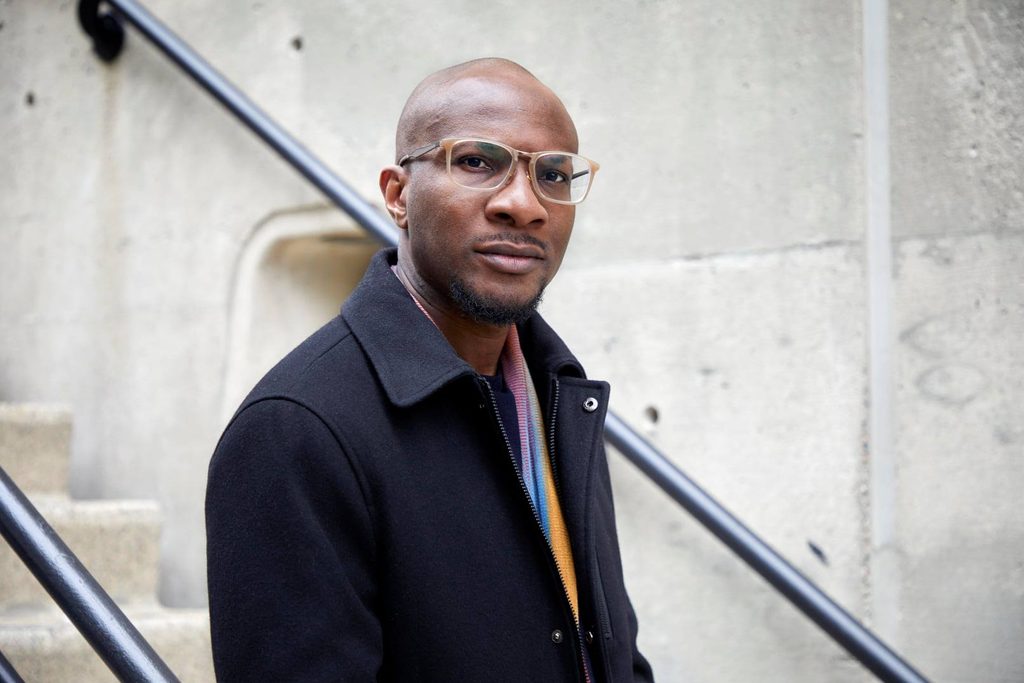
Teju Cole is the Nigerian-American author of two novels, Open City and Every Day is for the Thief and of the book of essays, Known and Strange Things. He is also the author or co-author of books of photographs and texts, among them Blind Spot. From 2015-2019 he was the photography critic of the New York Times Magazine; he is currently the Gore Vidal Professor of the Practice of Creative Writing at Harvard.
On Wednesday, February 3, Teju Cole read from his piece, “In Dark Times, I Sought Out the Turmoil of Caravaggio’s Paintings,” for the Carleton English Department and its guests. Today, we are going to use four words – manhole, travel, (de-)colonization, and students – to debrief our readers on what we heard, and what stood out to us.
Manhole
Cole shared that sometimes people tell him reading his work is like falling through a manhole. As he read his essay on Caravaggio, in which he describes how the work of this fugitive artist changed his understanding of beauty and suffering; we felt dropped into the streets of Valletta – into the very oratory where Caravaggio’s painting, “The Beheading of St. John the Baptist,” hangs today. How does Cole achieve this effect? In part, by believing spaces are forever marked by what happens within them, and by dedicating his life to discovering the stories of those dismissed as pedestrian or mundane. To transform places (and their objects) that might be overlooked, Cole uses a dynamic combination of history, poetry, photography, history, and politics; in the case of the paintings and criminal history of Caravaggio, this totals 10,000 words.
Travel
The importance of place to Teju Cole goes hand in hand with travel. To write Blind Spot, his multimedia diary of 150 full-color original photos and lyrical prose, Cole traveled to 25 different countries. His photos, he says, represent portals to the past. That being said, he is acutely aware of how political being a photojournalist can be. The travel, art, cooking, and style sections of daily newspapers address a certain audience: white and well-to-do. As Cole explained, travel writing often operates to confirm this demographic in their tastes, enticing them to infuse their resources into foreign economies and/or churning out images of poverty to “raise awareness.” To discourage this transactional, colonialist consumption of images, he chooses to incorporate his photographs into longer essays and books. He hopes that this way, readers will have the time and space to imagine as equals the people about whom he writes.
(De-)Colonization
When asked what he thought about the term “de-colonization,” Teju Cole shook his head. He told us he celebrates what happened in the 1950s, 60s, and 70s: the world changing as many of the colonized nations in Africa won their independence. “How could anybody ever have thought that was a reasonable way to organize the world?” he exclaimed. That being said, he acknowledges just how much the colonial mindset permeates societies today – we haven’t de-colonized everything! Elaborating on his critique of travel writing, he asked us to consider why Americans think it is acceptable to profit from another person’s suffering…but call it art. Whereas American children can grow up to become photojournalists, the children featured in their articles and photographs rarely can. For this reason, the term “de-colonization” doesn’t really work for him; it attempts to erase a system and history that is still very much relevant.
Students
It was abundantly clear how much Cole loves teaching students at Harvard. He is well read; his writings are so filled with allusions that one might think he reads exclusively Greek and Roman literature. But Cole told us that as a professor, most of the reading he does these days is of student work. “It isn’t always good,” he admits, “but when it is, usually towards the end of the semester, it is such a thrill.” That being said, he doesn’t think it necessary for all his students to be writers or artists. His goal for them is to live intentionally with the cards they have been dealt.
In addition to student essays and classics, Cole reads a lot of poetry and black literature. He also enjoys a fair amount of films and television series. As a critic as well as an artist, he confesses, “Netflix has a lot for me!”